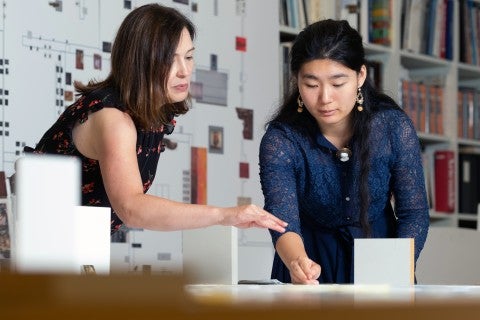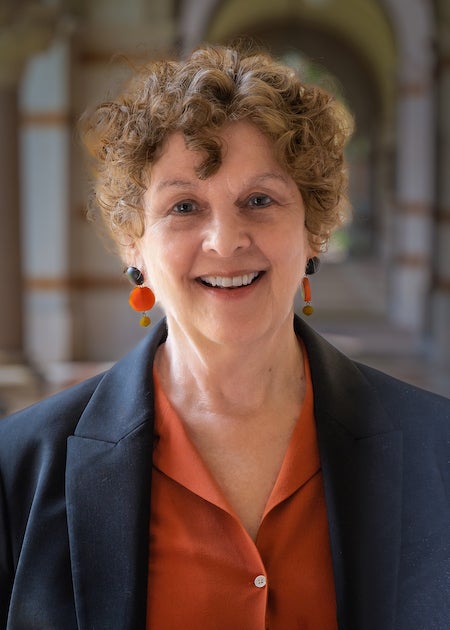
This newsletter comes against the backdrop of a year that has presented us all with unexpected challenges — and the people of Uvalde and Buffalo with the unspeakable outcomes of gun violence that has become much too familiar. Our hearts go out to these communities and our resolve is strengthened to educate our students as future citizens who will shape a more civil, just and equitable society.
Although the spring brought us hope for a new "post-COVID" phase, we continued to experience periodic COVID cycles on campus, which necessitated some postponements or cancellations of long-anticipated speakers, conferences or research travel. As humanists, we are well aware that there is no definitive end to most transformative events, whether pandemics, wars or attempts to overturn democracy, which live on as aftermaths.
It should not take a pandemic to illustrate the crucial place of the humanities in preparing our students to shape and lead social, cultural and economic processes of the future. Yet we are thrilled that Rice has deepened its investments in the humanities in these times: since 2018, we have hired 27 new faculty members in highly competitive searches, including six new colleagues who will join us in 2022-2023 in Philosophy, Modern and Classical Literatures and Cultures, English, and a cluster of three first-rate artists in Visual and Dramatic Arts. We look forward to learning more about all of our new faculty who have joined us since the start of the pandemic through school-wide events and lightning talks next fall and spring.
Not only our new faculty inspire us, but also the stunning new building for the visual arts, Susan and Fayez Sarofim Hall. Thanks to the continued support of our community, Sarofim Hall has progressed from pre-design to schematic design. The advancement of this project has been helped by the tireless vision and partnership of both President David Leebron and by architect and alumnus Charles Renfro '89, of Diller Scofidio + Renfro. They have engaged the Dean's Office, our school and our alumni to inspire the support we need to realize this new 80,000-square-foot home for Rice's art students and faculty. I hope you will continue reading with excitement about our new faculty hires, including those who — with our students — will activate this future creative hub. Our continued gratitude is owed to all of you who have contributed to this transformative project.

Rice Humanities has joined and actively participated in national humanities organizations that highlight innovative humanities research, lead transformations of humanities PhD training and encourage innovation in humanities undergraduate education. Rice University and the School of Humanities accepted the invitation of the American Council of Learned Societies (ACLS) to join its Research University Consortium, a leadership group in the academic humanities and interpretive social sciences. In this, we join 39 leading universities and peer schools committed to excellence in humanities research. We are also a member of the National Humanities Center (NHC) and as such, our faculty can apply for summer writing fellowships. We are thrilled that Nicole Waligora-Davis, the Alan Dugald McKillop Professor in English and associate chair of the Department of English, and Sarah Ellenzweig, associate professor of English, have been awarded fellowships to pursue their writing at the NHC in North Carolina this summer (postponed since 2020).
GUGGENHEIM FELLOWSHIP
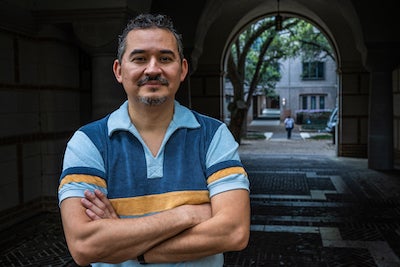
We are enormously proud of Tomás Morín, an assistant professor in Creative Writing, for winning a 2022 Guggenheim Fellowship, one of the very highest honors in the academy.
An esteemed poet, memoirist and translator, he is one of three new faculty who have recently joined our accomplished Creative Writing faculty and the second to win this prestigious fellowship. His Department of English colleague, Lacy M. Johnson, received it in 2020.
Morín published his third and most recent collection of poetry, Machete, in October. His debut memoir, Let Me Count the Ways, was published in March. Earlier this year, he was awarded a National Endowment for the Arts Fellowship.
UNIVERSITY AWARDS
We extend our warmest congratulations to the following School of Humanities faculty for receiving the George R. Brown Award for Superior Teaching:
Esther Fernández, associate professor in Spanish and Portuguese in the Department of Modern and Classical Literatures and Cultures; W. Caleb McDaniel, the Mary Gibbs Jones Professor of Humanities, Chair of the Department of History and Co-Chair of the Task Force on Slavery, Segregation and Racial Injustice; and Naoko Ozaki, lecturer in Japanese in the Center for Languages and Intercultural Communication.
The following faculty and students were honored by Rice this year for excellence in teaching, mentoring and service. They make us so proud!
Faculty
Claire Fanger, associate professor in the Department of Religion, was awarded the Sarofim Professor for Distinguished Teaching in the Humanities.
Matthias Henze, the Isla Carroll and Percy E. Turner Professor of Biblical Studies in the Department of Religion, received the Graduate Liberal Studies Program’s John Freeman Teaching and Mentoring Award.
Daniel Domingues da Silva, associate professor in the Department of History, director of undergraduate studies in the Center for African and African American Studies and host of SlaveVoyages.org, received the Teaching Award for Excellence in Inquiry-Based Learning and a Charles W. Duncan Jr. Achievement Award for Outstanding Faculty.
Margarita M. Castromán Soto, assistant professor in the Department of English and an affiliated faculty member in the Center for African and African American Studies, received the Sophia Meyer Farb Prize for Teaching (Phi Beta Kappa Teaching Award).
Students
Leenah Abojaib ’22 (Wiess College), who majored in Spanish and Portuguese as well as Biochemistry and Cell Biology, received the Student-Taught Course (STC) Teaching Award; see also the related Rice Magazine story.
Cindy Dawson, a PhD candidate in the Department of Religion, received a Graduate Teaching Award for Independent Instruction. She is in the final stages of writing her dissertation, “Woman Zion, Out of Hand: A New Materialist Study of Zion’s Movement Within and Between Biblical and Extrabiblical Texts.”
Kimberly V. Jones, a PhD candidate in the Department of History, received a Graduate Teaching Award for Independent Instruction. Her research focuses on histories of the Afro-Atlantic world, the gendered identities of Black women and African American history, and her dissertation is titled “Critical Bodies: Slavery, Gender and Disability in Early Republic Virginia.” Jones has received a highly competitive Women's Studies Fellowship for next year from the Institute for Citizens and Scholars and has accepted a prestigious Mellon/ACLS Dissertation Completion Fellowship.
Timothy Grieve-Carlson ’22 received the John W. Gardner Award for Best Dissertation in the Humanities for his doctoral dissertation in the Department of Religion, “American Aurora: Environment and Apocalypse in Early Pennsylvania.” The school-wide selection committee considered all five nominated dissertations to be exceptionally fine.
FACULTY DISTINCTIONS AND ACCOMPLISHMENTS

Timothy Morton, the Rita Shea Guffey Professor of English, was the inspiration behind filmmaker Adam McKay’s comedy on climate, “Don’t Look Up!” McKay’s production company, Hyperobject Industries, takes its name from a term coined by Morton. One of the world’s leading environmental philosophers and a popular lecturer with a rising international profile, Morton is teaching "What Is a Fact?", one of our two Big Questions courses offered to all Rice undergraduates this fall.
Jeffrey J. Kripal, the J. Newton Rayzor Professor of Religion, organized “Archives of the Impossible,” one of the largest conferences ever sponsored by the School of Humanities. With more than 1,700 registrants, it brought scholars from across the world together for plenary talks, discussions and a tour of the archives themselves: a treasure trove of documents in Fondren Library’s Woodson Research Center that were donated by the world’s most well-known researchers of the paranormal. Views of the presentations and pre-conference webinars on our YouTube channel have topped 156,000. In addition to hosting the conference and serving as the school’s associate dean of faculty and graduate studies, Kripal has written a new book, The Superhumanities: Historical Precedents, Moral Objections, New Realities, to be published by the University of Chicago Press later this year.
Kiese Laymon, the Libby Shearn Moody Professor of Creative Writing and English, won the NAACP Image Award for his novel, Long Division, and his essay collection, How to Slowly Kill Yourself and Others in America, was named a New York Times notable book in 2021. The recipient of the 2022 United States Artist Fellowship from the Mellon Foundation, Laymon is at work on several projects, including a new book, Good God, and the cinematic adaption of his bestselling memoir, Heavy: An American Memoir.
Andrea Bajani, writer-in-residence in the Department of Modern and Classical Literatures and Cultures, was awarded one of Italy’s top literary awards and was among the finalists for the nation’s other top prizes for his latest book, Il libro delle case, and his recent volume of poetry. His novel — published in 15 different countries and almost as many languages — was named one of the top 10 books of the year in Corriere della Sera's international list for 2021. One of the most respected and award-winning novelists of contemporary Italian and European literature, Bajani teaches in Modern and Classical Literatures and Cultures and in the Department of English’s Creative Writing program, and he co-taught our Big Questions course, "Is This the End?"
Kirsten Ostherr, the Gladys Louise Fox Professor and chair of the Department of English and director of the Medical Humanities Program, will join experts from other universities at the National Humanities Center this summer to address artificial intelligence (AI) and curriculum development in the humanities. Ostherr, a media scholar, health researcher and technology analyst whose research focuses on trust and privacy in digital health, will work to create courses to help students understand the ways AI technologies are integrated into modern life — and to think through the ethical issues involved in developing and deploying them.
Gisela Heffes, professor of Latin American literature and culture in the Department of Modern and Classical Literatures and Cultures and a member of the Center for Environmental Studies’ faculty steering committee, has been appointed co-president of the Association for the Study of Literature and Environment (ASLE), the second Rice professor appointed to the position. The late English professor Walter Isle, founding co-director of the Center for the Study of Environment and Society, served as ASLE president from 1999-2001.
Daniel Domingues da Silva, associate professor of history and director of undergraduate studies in the Center for African and African American Studies, received a National Endowment for the Humanities grant to support his collaborative work with Lancaster University to develop the Digital Archive of the Atlantic Slave Trades. The NEH award will allow this vital data to be linked to Slave Voyages, the world’s largest repository of data on the slave trade, which is housed at Rice.
Julie Fette, associate professor of French studies in the Department of Modern and Classical Literatures and Cultures, has won a 2022-23 Fulbright U.S. Scholar grant to research migration and citizenship in French children’s literature. Her research background in French studies includes work across many intersecting topics, including migration, racism and gender, all driven by the question that’s defined her scholarship: why do human beings discriminate against and exclude others?
NEW GRADUATES SPOTLIGHT
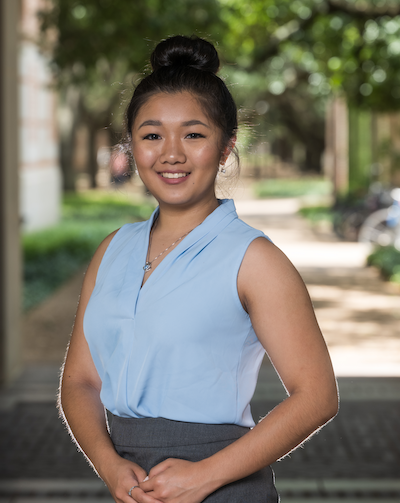
A history major who minored in Politics, Law and Social Thought and Poverty, Justice and Human Capabilities, Victoria Saeki-Serna '22 (Baker College) found her passion in Latin American political history. Now, the Rice Historical Review co-editor and Ira and Patricia Gruber Award winner (for her honors thesis) will take her interdisciplinary coursework, research and internship experiences with her as she pursues a PhD in history at Georgetown University.
Katelyn Landry, Ben Schachter and Victoria Zabarte spent well over a year researching slavery in Texas and adding new records to SlaveVoyages.org, the largest online repository of records on the slave trade, housed at Rice. Landry, a history major who minored in anthropology and Politics, Law and Social Thought, Schachter, a history and Latin American Studies double major, and Zabarte, a history major who minored in African and African American Studies, documented 15,000 enslaved people who were transported to ports along the Texas coast. If you will be on campus this summer, check out the poster display in Fondren Library to learn more about their work.
EXTRA: Learn more about Katelyn Landry, Victoria Saeki-Serna and Victoria Zabarte and their fellow Humanities Mellon Mays Fellows — Jay Bethea, Isabella Bowers, Pauline Huff and Shifa Rahman — from their diverse research experiences and shared commitment to eradicating racial disparities to their future plans.
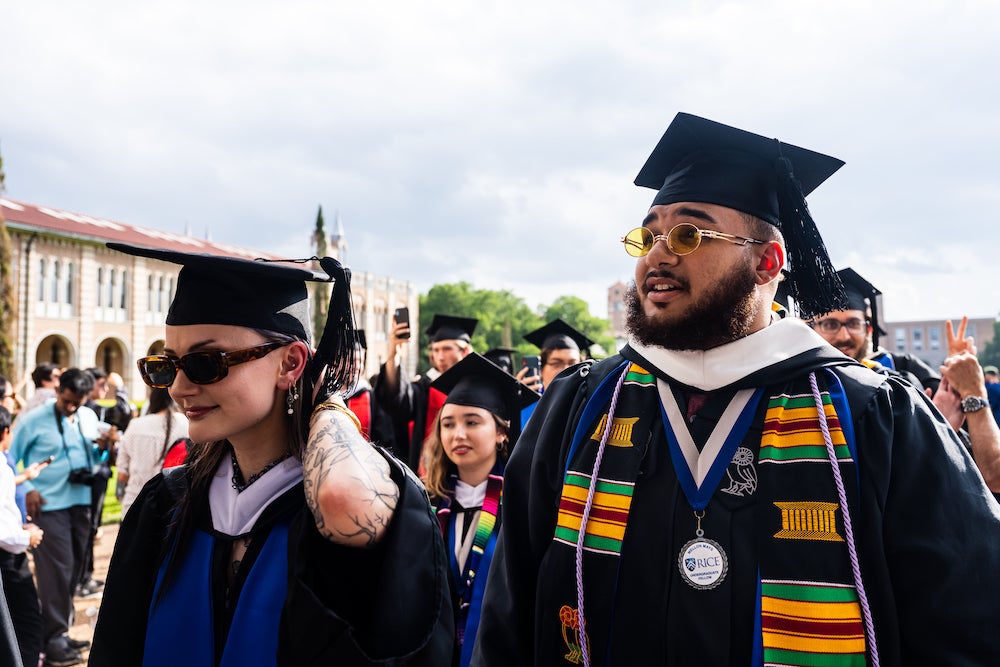
MOODY FUND FOR STUDENT OPPORTUNITY
The landmark $100 million gift from the Moody Foundation provides the naming gift for the Moody Center for Student Life as well as several new endowments in support of student programs. The School of Humanities is thrilled this gift to Rice includes funding for three signature programs:
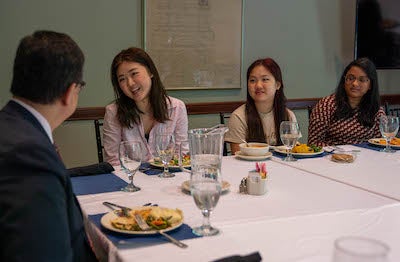
The Elizabeth Lee Moody Undergraduate Research Fellowship in the Humanities and the Arts provides humanities majors with the tools, resources and opportunities to pursue their research interests. Undergraduate fellows receive at least one summer of funding support for a research project or a humanities-related internship. They meet monthly with faculty and visiting speakers for presentations on research and definitive issues in the humanities — visiting scholars like Jorge L. Contreras ’88, shown above, a Rice graduate (English and Electrical Engineering) and University of Utah law professor, who recently spoke on campus about his new book, The Genome Defense: Inside the Epic Legal Battle to Determine Who Owns Your DNA.
The Elizabeth Lee Moody International Fund in the Humanities and the Arts supports courses and programs, including the Rice in Country program led by faculty in our Center for Languages and Intercultural Communication that gives students from across Rice opportunities to learn languages in summer courses that involve an immersion experience abroad. This fund will also support other spring break and summer courses with experiential learning components that take place abroad.
And the future Elizabeth Lee Moody Junior Professorship in Community Engagement and Civic Participation.
ALUMNI PROFILES
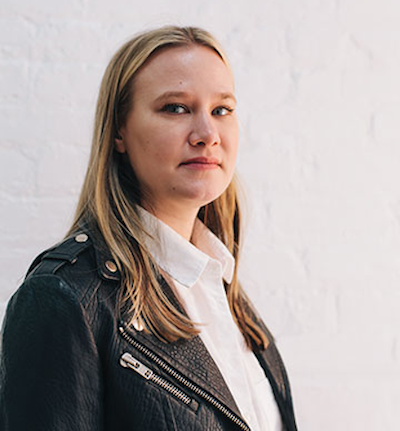
Alumni Spotlight: Khrista Rypl ’09 After a decade of work with the likes of ESPN, The Atlantic, American Public Media and WNYC Radio, Khrista Rypl ’09 was offered an opportunity to produce a show on the story of how a famous New York psychologist, Isaac Herschkopf, exploited his millionaire patient, Martin “Marty” Markowitz, for decades. This English major and journalist’s popular podcast is now the hit series, “The Shrink Next Door.”
Alumni Spotlight: Peter Clarke ’00 For the past 15 years, Peter Clarke ’00 has created practical special effects — animatronic puppets in particular — for film, TV and commercial productions, including key characters in “The Mandalorian,” “Pacific Rim,” “Runaways” and “Finch.” During his time studying painting and sculpture at Rice, Clarke studied abroad in Florence, Italy, where he started making wearable artwork that viewers could interact with physically.
STRATEGIC INITIATIVES AND PRIORITY PROJECTS
Center for Environmental Studies
The School of Humanities, under the rubric of the Civic Humanist Program, hosted a daylong visit for high schoolers from the International School of the Americas in San Antonio, organized by Fay Yarbrough ’97, professor of history and associate dean for undergraduate programs and special projects in the School of Humanities, and Nyeva Agwunobi, the school’s executive director of programs and strategic initiatives. The group of 117 students, in the company of several teachers, visited Rice to learn about our liberal arts undergraduate education. They were most interested in our robust offerings in Environmental Studies and learned during their stay about Rice’s commitment to a carbon-neutral future from executive director for sustainability and co-director of the Environmental Studies minor, Richard Johnson, and the connection between studying literature and the environment from William Shakespeare Professor of English Joseph Campana, director of the Center for Environmental Studies and co-director of the minor.
Diluvial Houston Initiative
Rice’s Diluvial Houston Initiative is a project of our Humanities Research Center funded by the Andrew W. Mellon Foundation and under the leadership of Joseph Campana, the William Shakespeare Professor of English and director of the Center for Environmental Studies; Farès el-Dahdah, professor of art history; and Melissa Bailar, director of grants and initiatives in the Humanities Research Center and associate director of the Medical Humanities Program, as of July 1. It brought leading environmental artists and activists together on campus for a four-day workshop as part of a new arts incubator. The workshop coincided with the Rice-hosted Society of Environmental Journalists conference.
Humanities Research Center
Our Humanities Research Center has launched a process of transformation and renewal, with the goal of raising the visibility and impact of humanities and artistic endeavors at Rice. Through this process, which continues through 2023, we aim to advance innovative and interdisciplinary inquiry across humanities departments and interdisciplinary programs and strengthen ties between the center and national humanities foundations and associations, including the Consortium of Humanities Centers and Institutes (CHCI) — indispensable partners in addressing the challenges facing the humanities both within our institutions and in the broader public sphere.
The Humanities Research Center, in partnership with universities in Ireland, Estonia, South Africa and Australia, received an award from the Consortium of Humanities Centers and Institutes as part of its Global Humanities Institutes. Joseph Campana, the William Shakespeare Professor of English and director of the Center for Environmental Studies, is co-principal investigator of the project, “Post-extractivist legacies and landscapes: Humanities, artistic and activist responses.”
BIG QUESTIONS
Big Questions course subjects vary wildly, but each class shares a common goal: exposing students to the thought-provoking, inherently interdisciplinary world of humanities education at Rice. In recent years, they’ve been some of the university’s most sought-after courses, often filling up quickly with eager Owls flocking in from diverse majors and academic backgrounds. One of this fall’s courses promises to spur students to think critically about what makes bodies normal as opposed to abnormal, while the other course will push students to examine just what, exactly, is a fact.

NEW APPOINTMENTS
Faculty
On July 1, 2022, we are thrilled to welcome the following new faculty:
Samuel Reis-Dennis, whose primary philosophical fields are normative ethics, moral psychology and bioethics, joins us an assistant professor of philosophy. He was hired through a joint search in Philosophy and Medical Humanities and will teach courses on medical and bioethics in the Medical Humanities Program.
Ragini Tharoor Srinivasan, who works at the intersections of Asian American and South Asian Anglophone literatures and cultural production, joins us from the University of Arizona as an assistant professor in the Department of English.
Sindhu Thirumalaisamy, an artist and filmmaker whose 2019 film “The Lake and the Lake” about a toxic lake in Bangalore won Best Documentary at the Ann Arbor Film Festival, joins us an assistant professor in the Department of Visual and Dramatic Arts.
In January 2023, the second of three new Visual and Dramatic Arts faculty hires will join us:
Kenneth Tam, a lecturer in sculpture and drawing at Princeton University who works in video, sculpture, installation and photography and makes work about the performance of masculinity, physical intimacy and private ritual, joins us as an assistant professor in Visual and Dramatic Arts.
Postdoctoral Fellows
The Humanities Research Center is excited to welcome two young scholars to one-year postdoctoral fellowships in Latinx Arts, Literatures, Cultures or Religions. The fellowships are affiliated with our newly formed Initiative for the Study of Latinx America (ISLA).
Joining us on July 1, 2022 are:
Sarah Bruno, who received her PhD in cultural anthropology in 2021 from the University of Wisconsin-Madison. In 2021-2022, she was a postdoctoral fellow in ethnography of race and digital technologies in the John Hope Franklin Humanities Institute at Duke University. Her research and art lie at the intersections of performance, diaspora and colonialism.
Carlos Kelly graduated with a PhD in Latinx studies and video games studies in 2022 from Ohio State University, where he also received a graduate minor in women, gender and sexuality studies. His research merges the fields of Latinx studies and video game studies by interrogating the liminal spaces associated with video games, specifically video game consoles, and how Latinx theory, through mestizaje, can open up new modes of analysis and study.
The Humanities Research Center is also pleased to welcome a young scholar to a one-year postdoctoral fellowship in Law, Political Thought and the Humanities. This fellowship is affiliated with our Program in Politics, Law and Social Thought (PLST).
Joining us on July 1, 2022 is:
Michael Schwarz, who received his PhD in philosophy in 2022 from Northwestern University. He holds a PhD in law from Humboldt-University Berlin, specializes in social and political philosophy, ethics and critical theory, and has interests in philosophy of language and philosophy of law.
The Center for the Study of Women, Gender and Sexuality welcomes on July 1, 2022:
Tesla Cariani, a visiting assistant professor of English at Emory University, where she received a PhD in English as well as a graduate certificate in women’s, gender and sexuality studies. Encompassing questions of aesthetics, affect and political activism, Tesla’s teaching and research interests include 20th and 21st century American literature, visual culture studies and digital/public humanities.
We are thrilled that the following postdoctoral fellows will continue their appointments in 2022-2023:
Carly Boxer, the Nancy and Robert J. Carney Postdoctoral Fellow in Medieval Art and Architecture in the Department of Art History
Laura Correa Ochoa, a Rice Academy of Fellows Postdoctoral Fellow in the Department of History
Sophie Sapp Moore, a Mellon Foundation Postdoctoral Fellow in Environmental Justice in the Humanities Research Center and the Center for Environmental Studies
Daniella Farah, a Samuel W. and Goldye Marian Spain Postdoctoral Fellow in the Program in Jewish Studies
Tamar Sella, a Samuel W. and Goldye Marian Spain Postdoctoral Fellow in the Program in Jewish Studies
FACULTY PROMOTIONS
We are pleased to congratulate Graham Bader on his appointment to full professor of Art History; Niki Kasumi Clements, the Watt J. and Lilly G. Jackson Assistant Professor of Religion, to associate professor with tenure; Hélade Scutti Santos, director of the Center for Languages and Intercultural Communication (CLIC), to teaching professor; Maryam Emani (CLIC) to associate teaching professor and Ian Schimmel (Department of English) to associate teaching professor.
LEADERSHIP IN THE SCHOOL
Faculty
We extend our warmest thanks to Anthony B. Pinn, the Agnes Cullen Arnold Distinguished Professor of Humanities, professor of religion and founding director of the Center for African and African American Studies (CAAAS), shared with Social Sciences, for his leadership of CAAAS (2019-2022). He will take a well-deserved sabbatical during 2022-2023. We are grateful to Jeffrey Fleisher, professor and chair of the Department of Anthropology and a member of the CAAAS steering committee, for serving as interim director as we conduct a nationwide search for the new director.
We also wish to express deep thanks to our departing department chairs, Christian J. Emden, the Frances Moody Newman Professor and Professor of German Intellectual History and Political Thought, and Elias Bongmba, the Harry and Hazel Chavanne Professor in Christian Theology and Professor of Religion, for their leadership of their departments and contributions to the intellectual life in the school. At the same time, we welcome Jacqueline Couti, the Laurence H. Favrot Professor, as chair of the Department of Modern and Classical Literatures and Cultures (2022-2025) and Professor of Religion William Parsons as the interim chair of the Department of Religion (2022-2023).
Matthias Henze, the Isla Carroll and Percy E. Turner Professor of Biblical Studies who has been away as the Martin Hengel Fellow at the University of Tübingen in Germany, returns as director of the Program in Jewish Studies; we thank G. Daniel Cohen, the Samuel W. and Goldye Marian Spain Associate Professor of History, for serving as interim director this past year.
Graduate Students
We wish to thank our terrific Humanities Graduate Student Association President and Vice President Nina Cook and Paul Burch, both graduate students in the Department of English, who valiantly stepped up to support School of Humanities graduate students as they contended with the changing tax laws. Nina and Paul brought vision and energy to the School of Humanities, and the Dean’s Office team congratulates them on their accomplishments amidst many challenges this past year.
IN REMEMBRANCE
We remember the following members of our community who passed away this year:
Neil "Sandy" Havens '56, professor emeritus of art and art history whose passion for theater led him to become the first professional director of the Rice Players.
Anita Kiperman, who joined the Department of Hispanic and Classical Studies in 1973 and enriched, nurtured and inspired students for the next 25 years. To ensure that her vital legacy of Spanish language education and outreach continues, her family has created the Anita Kiperman Spanish Language Fund.
Mary Tobin '73, a longtime English lecturer and volunteer who taught generations of Rice students the art and craft of better writing.
Fiona Tolhurst '90, who studied English literature at Rice, graduating Magna cum Laude and Phi Beta Kappa. A recognized authority on Geoffrey of Monmouth, particularly feminist approaches to Geoffrey, she was professor of Medieval English and chair of the Department of Language and Literature at Florida Gulf Coast University.
EVENT HIGHLIGHTS
Kazimi Lecture in Shi’i Studies
University of Chicago Islamic studies scholar Alireza Doostdar contemplated God and Satan in modern Shi’i thought, the topic of his forthcoming book, as part of our third annual Kazimi Lecture in Shi’i Studies. Through this series, endowed by the children of Syed Safdar and Samina Kazimi, the School of Humanities brings in scholars such as Doostdar each year whose research promotes understanding of Shi’i Islam in its many dimensions.
UPCOMING EVENTS
SAVE THE DATES
October 28-29, 2022
OwlTogether (Homecoming & Reunion and Families Weekend)
November 7-8, 2022
School of Humanities Campbell Lectures with journalist and writer Masha Gessen
Gessen is the author of 11 books, including Surviving Autocracy and The Future Is History: How Totalitarianism Reclaimed Russia, which won the National Book Award in 2017.
I look forward to seeing many of you in person when we return to campus in the fall. Until then, I extend a warm congratulations to our graduates, offer my gratitude to all our faculty and staff, and wish all of you good health this summer!
Kathleen Canning
Dean, School of Humanities
Andrew W. Mellon Professor of History
Rice University

